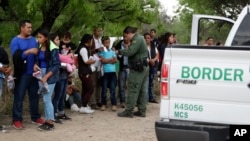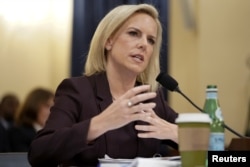The U.S. border with Mexico could be ordered closed within days, President Donald Trump told reporters Friday.
"There's a very good likelihood that I'll be closing the border next week, and that will be just fine with me," Trump said at his Mar-a-Lago estate in Florida, expressing frustration with continued illegal immigration into the United States.
Earlier in the day, Trump accused Mexico of not doing enough to halt migration from Central American countries, warning that if Mexico did not "stop them, we're closing the border. And we'll keep it closed for a long time. I'm not playing games."
Trump referred to caravans of migrants — including one with hundreds of people intent on the reaching the United States — as the reason Mexican officials needed to take immediate action.
"Mexico does not act on the basis of threats," the country's secretary of foreign affairs, Marcelo Ebrard, quickly replied on Twitter. "We're a great neighbor."
Although Trump, on Twitter and in remarks on Friday, asserted Mexico was "doing nothing" to halt the migrant flow, officials in that country say they are trying to break up the caravans, are increasingly detaining and deporting migrants, and have stopped issuing humanitarian visas at the border with Guatemala.
It was not clear whether Trump's border closing threat would also apply to air travel.
Shutting down trade across the border would have significant economic ramifications. Mexico is the United States' third-largest trading partner, with more than $600 billion worth of products going one way or the other across the border in 2018, according to the U.S. Census Bureau.
A closing of the U.S.-Mexico border would be "an unmitigated economic debacle," according to the U.S. Chamber of Commerce, which says such an action would threaten 5 million jobs in the United States.
The Trump administration, however, appears more focused on the problems associated with the one-way uncontrolled flow of people.
A spike in the number of border crossings in recent weeks has prompted Department of Homeland Security Secretary Kirstjen Nielsen to ask Congress for sweeping authority to deport unaccompanied migrant children more quickly; to hold families seeking asylum in detention until their cases are decided; and to allow immigrants to apply for asylum from their home countries.
On a call with reporters on Friday, a senior administration official acknowledged that the U.S. government was moving border agents from ports of entry to care for people who have been apprehended between ports of entry, a move that reduces the number of personnel at those border crossings.
If the number of people coming into the United States continues to increase without DHS gaining additional resources, the official said, the closure of some ports of entry would be "on the table."
In a letter to Congress on Thursday, Nielsen warned of "a cascading crisis at our southern border." She added: "The system is in free fall. DHS is doing everything possible to respond to a growing humanitarian catastrophe while also securing our borders, but we have reached peak capacity and are now forced to pull from other missions to respond to the emergency."
Noting that Congress had tasked DHS with taking "operational control of the border," Nielsen wrote that "we are increasingly unable to uphold that responsibility, given the emergency situation."
In her letter, Nielsen said that this month, DHS was on track to apprehend nearly 100,000 migrants.
"The system was not built for this. Our laws are just not built for this," a senior DHS official, referring to the current arrival numbers at the border, said during Friday's call with reporters.
DHS has repeatedly attributed logistical challenges at the southern border to a shift in demographics — with an increasing number of families arriving, compared with single men in earlier waves. By law, families can be detained for only a limited time. Nielsen is asking Congress to extend that.








